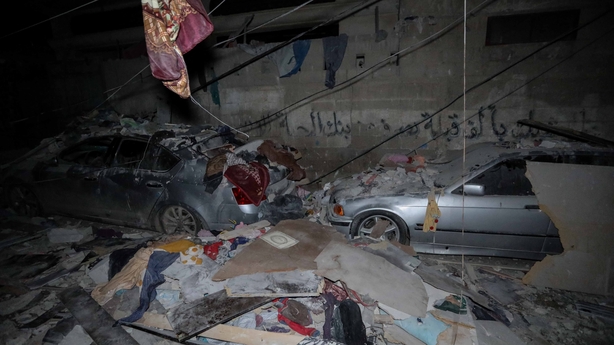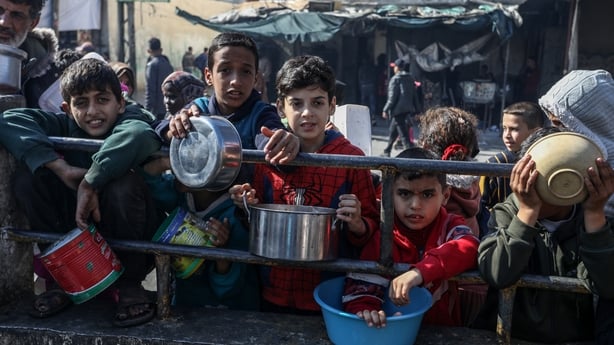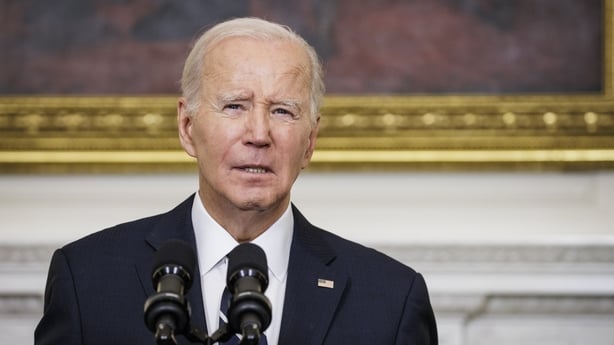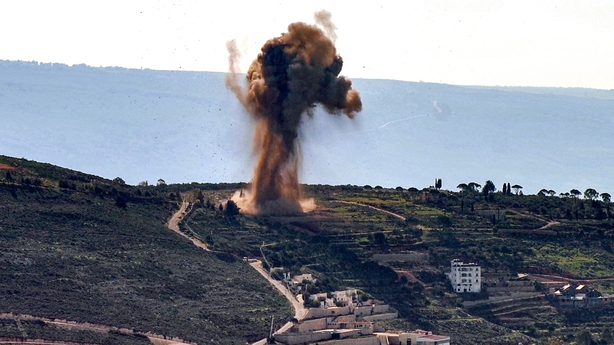Israeli Prime Minister Benjamin Netanyahu ordered the country's military to draw up a dual plan to evacuate Palestinian civilians from the crowded southern Gazan city of Rafah and defeat the last Hamas fighters there.
His office announced the move as pressure mounted on Israel over its threat to launch a ground assault on Rafah, the last refuge for hundreds of thousands of Palestinians who are trapped in the city after fleeing fighting elsewhere.
The office of Palestinian president Mahmoud Abbas said the plan aims to drive Palestinians from their land.
The office of Abbas, head of the Palestinian Authority that exerts partial self-rule in the Israeli occupied West Bank, said it holds both the Israeli government and the US administration responsible for the plan's repercussions.
The Palestinian presidency called on the UN Security Council to take heed, "because (Israel) taking this step threatens security and peace in the region and the world. It crosses all red lines," the statement said.
The United Nations has said that it is extremely worried about the fate of civilians in Rafah.
"What is clear is that people need to be protected, but we also do not want to see any forced displacement - forced mass displacement - of people, which is by definition against their will," UN spokesman Stephane Dujarric said.
"We would not support in any way forced displacement, which goes against international law."
"The unprecedented density of Rafah's population makes it nearly impossible to protect civilians in the event of ground attacks," the UN Office for the Coordination of Humanitarian Affairs said .
"The congestion in Rafah has reached a point where normal routes are blocked by tents set up by families seeking any flat, clean space available."
US President Joe Biden said yesterday that Israel's response to the 7 October attacks by Hamas militants was "over the top" and Washington said it would not support any military operation launched in Rafah without due consideration for civilians.
Aid groups said there would be a high Palestinian death toll if Israeli forces stormed Rafah and warned of the growing humanitarian crisis in the city, on the border with Egypt.
Mr Netanyahu's office said in a statement: "It is impossible to achieve the goal of the war without eliminating Hamas, and by leaving four Hamas battalions in Rafah.
"On the contrary, it is clear that intense activity in Rafah requires that civilians evacuate the areas of combat.
"Therefore, Prime Minister Benjamin Netanyahu has ordered the IDF (Israel Defence Forces) and the security establishment to submit to the Cabinet a combined plan for evacuating the population and destroying the battalions."

The statement, issued two days after Mr Netanyahu rejected a Hamas ceasefire proposal that also envisaged the release of hostages held by the Palestinian militant group, gave no further details.
Rafah has increasingly become the focus of Israel's military campaign in Gaza as its forces shift their offensive southwards in response to the 7 October attack by Hamas gunmen.
More than half Gaza's 2.3 million people are now sheltering there, many of them near the border fence and living in makeshift tents.
Doctors and aid workers in Rafah are struggling to supply even basic aid and stop the spread of disease.
"No war can be allowed in a gigantic refugee camp," said Jan Egeland, Secretary-General of the Norwegian Refugee Council, warning of a "bloodbath" if Israeli operations expand there.

In a further sign of the war's impact, almost one in 10 of Gazans under five are now acutely malnourished, according to initial UN data from arm measurements that show physical wasting.
The charity ActionAid said some Gazans were eating grass.
"Every single person in Gaza is now hungry, and people have just 1.5 to 2 litres of unsafe water per day to meet all their needs," it said.
Gaza's health ministry said at least 27,947 Palestinians had been confirmed killed in the conflict, 107 of them in the previous 24 hours, and 67,459 injured.
It has said many more could be buried under rubble from Israeli attacks since Hamas militants killed 1,200 people and took 253 hostages in Israel on 7 October, according to Israeli tallies.
Hours before Mr Netanyahu's statement, Israeli warplanes carried out new sorties in which Palestinian health officials said at least 15 people had been killed, eight of them in the Rafah area.
"We were sleeping inside and, when the strike hit, were thrown outside. After that, another rocket hit," said Mohammed al-Nahal, an elderly Palestinian standing beside the rubble of a building that had been hit.
"It destroyed the entire home. My daughter was killed. My daughter, her husband, her son, all were martyred," he added.
Israel's military said its forces had been in action in the area of Khan Younis and in northern and central Gaza to eliminate militant cells and destroy militant infrastructure.
It said that it takes steps to avoid civilian casualties and accuses Hamas militants of hiding among civilians, including at schools, shelters and hospitals.
Hamas has denied doing so.
A spokesperson for the UN children's agency UNICEF said the organisation's main concern over the escalation of fighting in Rafah is how it will "further impact the children" there.
Jonathan Crickx told RTÉ's Today with Clare Byrne that their concerns were not just around protection, but the essential services they need to have access to.
He said he was in Rafah a few days ago and described an extremely "dense" population where 1.3 million are taking refuge in tents and shelters.
He said: "When I was in Rafah you could hear bombing. Operations are taking place all over the Gaza strip."
He said 70% of the people who have been killed are reportedly women and children, adding: "We are scared and fear thousands more could die in the violence."

The US, Israel's main ally, has this week stepped up efforts to secure a ceasefire in Hamas-ruled Gaza, and also publicly criticised Mr Netanyahu's government.
"I'm of the view, as you know, that the conduct of the response in the Gaza Strip has been over the top," Mr Biden told reporters at the White House yesterday.
President Biden said he had been pushing for a deal to pause fighting to allow the release of hostages, increase the amount of humanitarian aid reaching Palestinian civilians and normalise relations between Israel and Saudi Arabia.
Hamas this week proposed a ceasefire of four and a half months, during which remaining hostages would go free, Israel would withdraw its troops and an agreement would be reached on an end to the war.
Mr Netanyahu said on Wednesday that Hamas' terms, offered in response to a proposal drawn up by US and Israeli spy chiefs with Qatar and Egypt, were "delusional" and vowed to fight on.
Hamas says it will not agree to any deal that does not include an end to the war and an Israeli withdrawal.
Israel said it will not withdraw or stop fighting until Hamas is eradicated.
Hoping to spur peace moves, US Secretary of State Antony Blinken visited the Middle East this week, and a Hamas delegation arrived in Cairo yesterday for talks with mediators Egypt and Qatar.
Foreign ministers of several Arab states discussed Gaza at talks in Riyadh at which the United Arab Emirates called for more efforts to prevent the conflict expanding across the Middle East.
Syrian state media reported that air defences had responded to "hostile targets" in the vicinity of Damascus, but did not immediately provide details.

Tensions are also high on the border between Israel and Lebanon. Sirens sounded in northern Israeli towns and Israel's military said it had intercepted a "suspicious aerial target" offshore from the city of Haifa.
A Lebanese security source said two unarmed surveillance drones had been launched from Lebanon over Israeli territory before returning.
The armed Lebanese group Hezbollah said it had hit "spying systems" in northern Israel but did not say what weapons were used.
Israeli operations in Rafah will add to 'endless tragedy' in Gaza - UN agency
Meanwhile, UNRWA chief Philippe Lazzarini, under pressure after Israel alleged 12 of the agency's staff took part in the deadly assault, has said the humanitarian situation in Rafah was increasingly desperate.
More than 1.2 million people, about half of the entire population of Gaza, are now crowded into the city, sleeping on the streets in makeshift accommodation, with food and water scarce.
"Any large-scale military operation among this population can only lead to an additional layer of endless tragedy that's unfolding," he told reporters in Jerusalem.
"There's a sense of growing anxiety and growing panic in Rafah. People have absolutely no idea where to go after Rafah."
Mr Lazzarini said air strikes had hit near UNRWA's base in Rafah, heightening tensions and fear among civilians, and putting into doubt the agency's overall relief effort.
UNRWA operations were "on edge", he said, adding: "I don't know how long we will be able to operate in such a high-risk environment."
The agency chief said the situation was worsening throughout southern Gaza, where police were becoming increasingly reluctant to provide escorts for aid trucks because of civil disorder.
Desperate Gazans were mobbing convoys in search of food. On top of that, eight police were killed in three separate air strikes in the last four days, he said, adding: "They're saying, enough is enough."
Mr Lazzarini had previously warned that the lives of at least 300,000 people in central and northern Gaza were at risk because of a lack of food but UNRWA was unable to get to the region.
The last time the agency was allowed to deliver supplies to the area was on 23 January.
